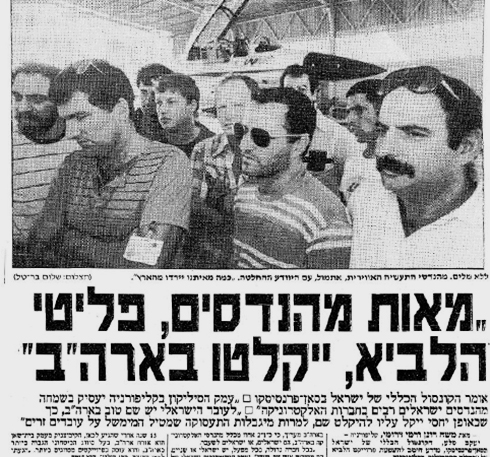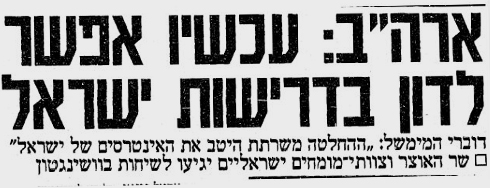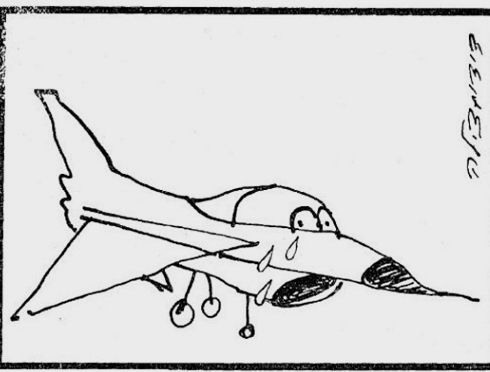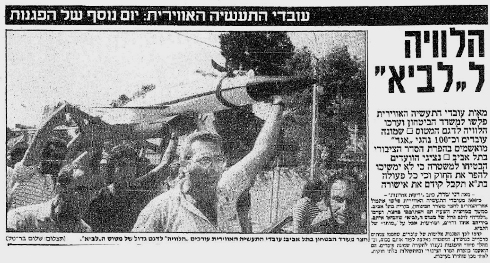
The Israeli fighter jet that never was
On this week, 28 years ago, a single vote decided to end the flagship program of the Israeli Defense Ministry and a source of national pride, enraging thousands of the project's workers.
It was supposed to be Israel's domestically built fighter jet for the new millennium, but in a decisive government meeting on the August 30, 1987, a single vote from the then health minister managed to seal the program's fate.
The Lavi program was born out of a 1970s vision within Israel Aerospace Industries (IAI) to design a domestically built fighter to meet the future needs of the Israeli Air Force. The government approved the project in 1980, and tasked IAI with designing the jet.
The program was fraught with controversy from the beginning, with claims being made that the programs massive cost would cripple the IDF's technological expansion, as well as causing irreversible damage to the Israeli economy.
On August 30, 1987, this week 28 years ago, Prime Minister Yitzhak Shamir called to order a meeting of the government ministers, after having convinced Tourism Minister Avraham Sharir of the program's necessity. It is believed that the vote to de facto kill the program brought forward by then Foreign Minister Shimon Peres was meant to result in a tie.
Shamir told Peres that he supported holding a vote over the cancellation of a program, thinking that he had a majority. Peres for his part asked that the ministers be allowed to leave the meeting for 30 minutes of consultations.
Peres turned to Health Minister Arbeli-Almozlino, who planned on abstaining from the vote, and attempted to persuade her to vote in favor of his measure. The main reason given to Arbeli, according to an article in Yedioth Ahronot, was that debate over the program had become politicized and as such a vote in favor of the program would be seen as a win for Likud.
The health minister said: "But you suggested that we not refer to this as a party issue in all our ministers' meetings. It is not my fault that you changed your stance multiple times. I am steadfast in my positions. You want to force your position onto me."
The Labor ministers returned to the government meeting without Arbeli-Almozlino. "I had to recover. I drank a glass of water, and washed my face," the minister explained after returning from the restroom. While the ministers were waiting for her, a harsh exchange took place between Ariel Sharon and Peres. Sharon said: "Did you convince Shoshana? Wasn’t it you who spoke against making this a party issue… Your plan does not offer an alternative to the Lavi and the continued technological advancement of the IDF."
Peres answered: "Why do you take everything so personally?" Sharon wasn’t going to give up, and answered: "We aren’t talking about personal issues, but the fact that your plans are not applicable." At that point Arbeli-Almozlino walked into the room, and Shamir called to order a vote. 12 ministers voted for Peres's proposal (including the Likud Finance Minister Moshe Nissim) and 11 voted against.

Arbeli-Almozlino, who stated that the "people want the Lavi," and that she was ready to impose a special tax for the project, was the one who put and end to the program. By not joining the program's supports, she sealed its fate. "I could not raise my hand in favor, and even voting against plagued my conscience. What opposition was I left with? Only abstaining," she said. Minister Moshe Arnas resigned from the government after the vote.
In an interview with Orly Azoulay a day after the vote, Arbeli-Almozlino said: "You are calling what they did to me a gang rape? It's possible. I must tell you that when I sat in the room with the ministers, I felt horribly isolated. I asked for a few minutes, so that I could be with myself, but they said no, you must vote no, decide now, there is no time. They told me that I am not in the government as an individual, the party sent you here.

"Peres told me 'I appointed you, you must accept my authority.' I was upset by the tone. I said, if that’s how things are, take back your mandate. I don’t need it, but then everyone suddenly jumped up and said what are you talking about, don’t take it so hard," Arbeli-Almozlino said.
The vote led to great anger among Israel Aerospace Industries workers, most of whom knew the result would cost them their jobs. The CEO of IAI at the time, Moshe Keret, said that about 3,000 to 4,000 workers would lose their jobs, most of whom worked in the company's engineering division. "The government's decision is erroneous, and we will suffer from the consequences for many years," he said.
"It's not just a project that ended, it’s the end of an era," Keret added. "I'm not sure if Israel will ever be able to field a domestically built fighter in the future." The number of workers who lost their jobs eventually reached 6,000.
A few days after the government's decision, the termination letters were already in the mail. Shamir spoke with the IAI employees as well as the head of the Lavi program, and his deputy, asking them to continue their public campaign for the Lavi. "It's important that you voice your explanation in a way that will reach the public at large," the prime minister said. "Ending the Lavi program hurts not only IAI, but also the state of Israel as a whole."
Later that week, 500 IAI workers entered the Defense Ministry's front yard in the Kiriya in Tel Aviv, and held a "funeral" for the program while holding roses and a massive Lavi flag they had brought with them. The workers also carried obituaries for the fighter jet.
The workers then marched on the US embassy, which supported the program's cancellation. "Visa, give us a visa," the workers shouted. Later that afternoon, the workers arrived at the Labor headquarters in Tel Aviv, where they held a roaring protest.
Other workers began blocking roads in the vicinity of Ben Gurion airport, setting tires on fire and blocking all the entrances to the airport. Workers got on top of the check-in desks and began waving fliers in front of the passengers. Large contingents of the border police were called to the scene, but the workers cooperated and left the area.
Another group of about 100 workers managed to break through one of the airport's fences near Or Yehuda. They spread out on the runway, stunning the tower controllers. After a short pause in takeoffs, the flights were diverted to the "quiet" runway that was not in use. The workers spent an hour on the runway, while the chief of the central district police attempted to convince them to disperse. They only left the area after a crowd dispersal vehicle arrived on the scene.
Hundreds of IAI workers headed to the US embassy the next day, in order to check into US visas. One of the workers said: "If they fire me, I have nothing to do here in Israel. I can get work in the US."
Later that week hundreds of IAI employees gathered outside the Foreign Ministry in Jerusalem waiting for a response to a request they submitted to meet with Peres. When the request was denied, chaos broke out, with dozens of workers rushing the building and scaling the fences in attempted to break in. The workers were later dispersed using smoke and gas grenades.
Altough the Lavi was not completed, it fostered the evolution of several advanced technological systems which are in use today, and in the eyes of many could have been the best plane in its class around the world.















